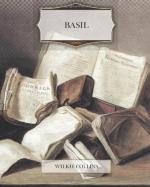She hastily returned to her room, and I went on down stairs. In the hall, the servant was waiting for me, with a letter in his hand.
“This was left for you, Sir, a little while ago. The messenger who brought it said he was not to wait for an answer.”
It was no time for reading letters—the interview with my father was too close at hand. I hastily put the letter into my pocket, barely noticing, as I did so, that the handwriting on the address was very irregular, and quite unknown to me.
I went at once into my father’s room.
He was sitting at his table, cutting the leaves of some new books that lay on it. Pointing to a chair placed opposite to him, he briefly inquired after my health; and then added, in a lower tone—
“Take any time you like, Basil, to compose and collect yourself. This morning my time is yours.”
He turned a little away from me, and went on cutting the leaves of the books placed before him. Still utterly incapable of preparing myself in any way for the disclosure expected from me; without thought or hope, or feeling of any kind, except a vague sense of thankfulness for the reprieve granted me before I was called on to speak—I mechanically looked round and round the room, as if I expected to see the sentence to be pronounced against me, already written on the walls, or grimly foreshadowed in the faces of the old family portraits which hung above the fireplace.
What man has ever felt that all his thinking powers were absorbed, even by the most poignant mental misery that could occupy them? In moments of imminent danger, the mind can still travel of its own accord over the past, in spite of the present—in moments of bitter affliction, it can still recur to every-day trifles, in spite of ourselves. While I now sat silent in my father’s room, long-forgotten associations of childhood connected with different parts of it, began to rise on my memory in the strangest and most startling independence of any influence or control, which my present agitation and suspense might be supposed to exercise over them. The remembrances that should have been the last to be awakened at this time of heavy trial, were the very remembrances which now moved within me.
With burdened heart and aching eyes I looked over the walls around me. There, in that corner, was the red cloth door which led to the library. As children, how often Ralph and I had peeped curiously through that very door, to see what my father was about in his study, to wonder why he had so many letters to write, and so many books to read. How frightened we both were, when he discovered us one day, and reproved us severely! How happy the moment afterwards, when we had begged him to pardon us, and were sent back to the library again with a great picture-book to look at, as a token that we were both forgiven! Then, again, there was the high, old-fashioned, mahogany press before the window, with the same large illustrated




